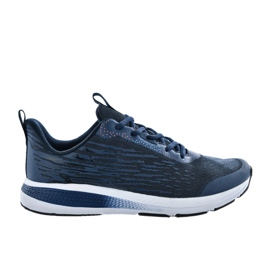Men's shoes made of synthetic material - perfect for daily outputs
Why should you choose shoes from synthetic?
Men's shoes made of synthetic material are becoming more and more popular, mainly due to their versatility, durability and attractive value for money. Synthetic as a material is characterized by high resistance to abrasion, moisture and ease of cleaning, which makes them a great choice for everyday use. In addition, modern technologies used in the production of synthetics allow to obtain materials that look almost like natural leather, and at the same time are more ecological and economical. Synthetics shoes are available in different styles and colors, thanks to which every man can adapt them to his individual taste and Wardrobe needs. This is a great solution for both a walk, work and casual meetings or exits.
Design and style - what do synthetic shoes offer?
Thanks to a wide range of patterns, colors and finishes, the shoes made of synthetic material are not only practical, but also fashionable. Manufacturers are increasingly reaching for modern technologies and trends to provide customers with footwear that combines comfort with aesthetics. The offer includes classic models on a flat sole, elegant versions with a slight heel, as well as sports shoes perfect on a daily basis. Details such as stitching, inserts from other materials or fashionable motifs make synthetic shoes to become a clear accent in your daily outfit, both casual and more formal.
Comfort and functionality every day
Men's shoes made of synthetic material are distinguished not only by aesthetics, but also with a high level of comfort of use. Soft insert, good fit to the foot and breathability of synthetic fabrics guarantee comfort even during a long wear. The construction of footwear ensures stability and support for the foot, which is extremely important for daily activities. Variants with a properly profiled sole absorb shocks and ensure comfort when walking on different surfaces, minimizing leg fatigue. It is footwear that will work both during short walks and intense days at work or during weekend trips.
Durability and care - how to care for synthetic shoes?
Synthetic shoes are not only durable, but also easy to care for. To keep their attractive appearance for longer, it is enough to regularly clean with a damp cloth and avoid contact with substances that can damage the surface. In the case of dirt more difficult to remove, you can use specialized means for the care of synthetics. It is also worth remembering to store footwear in a dry and well -ventilated place to prevent the formation of unpleasant odors and extend the service life of the half -buts. Their lightness makes them easy to store, and high -quality materials ensure long durability even with everyday use.
Ecology and alternative to natural skin
Nowadays, more and more attention is paid to ecology and sustainable development. By choosing shoes from synthetics, you can contribute to limiting the demand for natural skin, the production of which is associated with a negative environmental effect. Modern synthetics used in the footwear industry are often based on recovered materials, recycling or biodegradable components, which makes them more planet -friendly. In addition, synthetic shoes allow for a wide selection of models and styles, without having to use animal materials. It is a solution for ecologically aware people who value fashion, comfort and concern for the environment.
Who are the shoes from the synthetics for?
Men's shoes made of synthetic material are ideal for a wide audience. Perfect for men who value comfort and functionality, and at the same time wanting to look fashionable and elegant every day. These footwear is especially recommended for active people who need durable shoes for various occasions, regardless of the weather. Thanks to the diversity of styles, synthetic shoes can be a great choice for both young people and the elders, for those who prefer a casual look, as well as for lovers of more formal styles. Their easy care and affordable price make them a popular choice for a wide spectrum of consumers.
Where to buy shoes from synthetic?
Men's shoes made of synthetic material are available in many footwear stores, both stationary and online. It is worth using reputable brands and proven sellers to be sure about the quality of the product. Online stores often offer a wide selection of models, colors and sizes, as well as the possibility of other customers' opinions, which makes it easier to make a purchasing decision. When choosing, pay attention to the descriptions of materials, warranty conditions and available return options. Promotions, discounts and seasonal sales are opportunities that allow you to buy high -quality synthetic shoes at an attractive price. To sum up, online shopping is a convenient and often the most economical way to find the perfect shoes every day.























